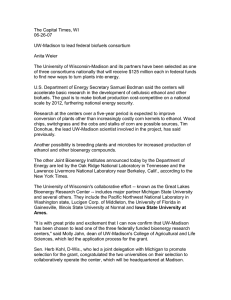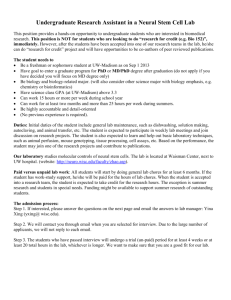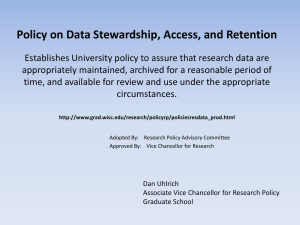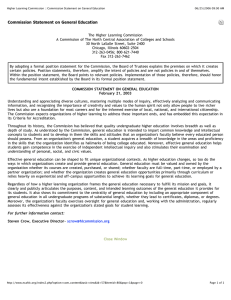Assessment Plan for General Education at the University of Wisconsin-Madison
advertisement
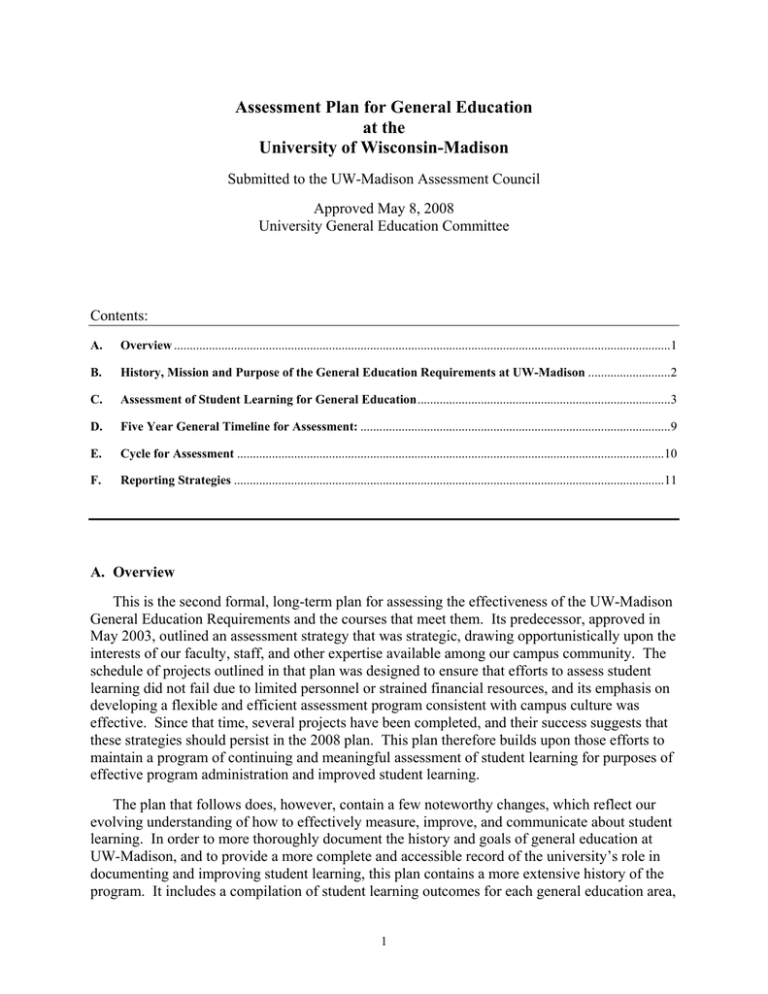
Assessment Plan for General Education at the University of Wisconsin-Madison Submitted to the UW-Madison Assessment Council Approved May 8, 2008 University General Education Committee Contents: A. Overview .............................................................................................................................................................1 B. History, Mission and Purpose of the General Education Requirements at UW-Madison ..........................2 C. Assessment of Student Learning for General Education................................................................................3 D. Five Year General Timeline for Assessment: ..................................................................................................9 E. Cycle for Assessment .......................................................................................................................................10 F. Reporting Strategies ........................................................................................................................................11 A. Overview This is the second formal, long-term plan for assessing the effectiveness of the UW-Madison General Education Requirements and the courses that meet them. Its predecessor, approved in May 2003, outlined an assessment strategy that was strategic, drawing opportunistically upon the interests of our faculty, staff, and other expertise available among our campus community. The schedule of projects outlined in that plan was designed to ensure that efforts to assess student learning did not fail due to limited personnel or strained financial resources, and its emphasis on developing a flexible and efficient assessment program consistent with campus culture was effective. Since that time, several projects have been completed, and their success suggests that these strategies should persist in the 2008 plan. This plan therefore builds upon those efforts to maintain a program of continuing and meaningful assessment of student learning for purposes of effective program administration and improved student learning. The plan that follows does, however, contain a few noteworthy changes, which reflect our evolving understanding of how to effectively measure, improve, and communicate about student learning. In order to more thoroughly document the history and goals of general education at UW-Madison, and to provide a more complete and accessible record of the university’s role in documenting and improving student learning, this plan contains a more extensive history of the program. It includes a compilation of student learning outcomes for each general education area, 1 and provides references to annual reports and other documents discussing prior and ongoing assessment efforts. The report includes the requirements’ connection to a national initiative related to promoting liberal education. It concludes with an outline of priorities, a proposed series of projects, and a cycle for undertaking this important work. B. History, Mission and Purpose of the General Education Requirements at UW-Madison The purpose of the General Education requirements is to ensure that every graduate of the University of Wisconsin-Madison acquires the essential core of an undergraduate education that establishes the foundations for living a productive life, being a citizen of the world, appreciating aesthetic values, and engaging in life-long learning in a continually changing world. For this reason, these core requirements provide for breadth across the humanities and arts, social studies, biological sciences and physical sciences; competence in communication, critical thinking and analytical skills appropriate for a university-educated person; and investigation of the issues raised by living in a culturally diverse society. (UW-Madison Undergraduate Catalog, and General Education Requirements website www.ls.wisc.edu/gened) The UW-Madison General Education Requirements (GER) were approved in 1994, after campus-wide discussions determined that the campus needed a program of general education to lay a foundation for students’ more advanced study and to ensure that all undergraduates met a uniform level of exposure to specific skills and types of knowledge essential to undergraduate education. Before this action, UW-Madison had no undergraduate requirements shared by all schools and colleges, with the exception of an Ethnic Studies requirement that had been adopted by each UW-Madison school and college that confers undergraduate degrees. Thus, students at the freshman and sophomore levels had not been consistently required to obtain communication (written and oral) or information literacy skills one might expect of a UW-Madison undergraduate. Indeed, prior to implementation of these requirements, fewer than 5% of UWMadison students were required to complete a writing course. Similarly, a small number of students were able to avoid taking college-level courses in essential quantitative skills. Furthermore, adoption of campus-wide “Breadth” requirements signaled campus-wide support for the idea that all students should be exposed to the variety of means by which the world is systematically studied, understood, and described via the natural, social and behavioral sciences and in literature, the arts, and humanities. The requirements, implemented for students who matriculated after May 20, 1996, consist of Communication (Comm A and B), Quantitative Reasoning (QRA and B), and “Breadth” requirements. Like the existing Ethnic Studies Requirement (ESR), they were adopted by all schools and colleges offering undergraduate degrees, with two provisos: each may identify additional requirements University General Education Requirements • Communication, 3 to 5/6 credits, Parts A & B • Breadth o Humanities/Literature/Arts, 6 credits o Natural Science, 4-6 credits o Social Studies, 3 credits • Ethnic Studies, 3 credits • Quantitative Reasoning, 3 to 6 credits, Parts A & B 2 consistent with its distinctive mission and degrees conferred, and each may specify for its students particular courses that serve both the general and distinct requirements. The University Academic Planning Council (UAPC) was charged with oversight of the requirements, and that body subsequently appointed the College of Letters and Science (L&S) to serve as the GER administrative “trustee.” L&S now convenes the University General Education Committee (UGEC), which includes faculty and staff from schools and colleges across the university. Committee members present a range of perspectives, including those offered by a selection of services and programs that have an institution-wide mission to support student academic success at the undergraduate level (e.g., Cross-College Advising Service, Student Orientation, Advising and Registration, Writing Across the Curriculum). Since the GER program was first implemented in 1996, the UGEC has submitted an annual report to the UAPC; these reports are available online at http://www.ls.wisc.edu/gened/FacStaff/background.htm#CampusAdministration. Each of these reports discusses efforts to assess the program, as well as changes made with the intention of improving program effectiveness. In 2005, assessment projects and reports were compiled on a website (http://www.ls.wisc.edu/gened/Assessment/default.htm) developed to make results of these studies more widely available. C. Assessment of Student Learning for General Education Administration and Governance. The UGEC is an advisory and policy body that focuses on campus-wide undergraduate general education. In that role, the committee oversees the assessment of student learning in the GER program. As noted above, administrative efforts, assessment projects and results, and recommendations for change are reported annually and ad hoc to the University Academic Planning Council (UAPC). The UAPC is a governance council convened under Chapter 6 of Faculty Policies and Procedure, and as the oversight committee for General Education, it is empowered to approve and enact recommendations for change on behalf of the faculty, which is granted statutory authority to oversee the curriculum. In considering the assessment of student learning in the UW-Madison General Education program, it is important to bear in mind that the requirements form a very modest general education package in terms of scope and number of credits required in each area. The program also allows for great diversity of course choice and is far from a “core” curriculum model. Within that context, assessment of student learning is coordinated by the University General Education Committee, upon the advice of the General Education Assessment Committee and its faculty director. General Education Learning Goals. In 2005-2006, UW-Madison was invited to join its sister institutions in the UW System as the pilot state for the Association of American Colleges and University’s ten-year project to promote an enhanced understanding of the role and value of higher education. Since then, discussions of the Liberal Education and America’s Promise project, or LEAP, have been held across campus. Many groups on campus have embraced this description of essential learning goals as an effective way to convey the aspirations of universitylevel education and what UW-Madison strives to impart to its students. The LEAP “Essential Learning Outcomes” provide a consistent framework for discussion of student learning, 3 particularly as adapted to the distinctive nature of UW-Madison, or the “UW-Madison Experience.” This perspective was supported by a campus-wide audit of expectations for student learning, which found that the existing UW-Madison GER program corresponds to the essential learning outcomes.1 The GER program provides a broad foundation upon which further study is based, and which is enhanced by advanced studies in the major and in distinct degree programs offered by the various schools and colleges. Similarly, the essential learning outcomes describe a broad range of knowledge and skills that are expected to help students recognize, understand, evaluate, and respond to the challenges of the twenty-first century. Although realizing all the goals of liberal education requires programming that extends beyond “general education” and includes deep learning in the major and in cocurricular experiences, the descriptions of essential learning provide a consistent framework for explaining why particular GER elements matter to students. The alignment of the UW-Madison GERs with these outcomes provides an opportunity also to contextualize the contributions of the many ways our students acquire the knowledge and develop the range of skills they will need in the future. The University Assessment Council has endorsed this framework as an effective way to describe the overall UW-Madison learning experience, of which General Education is one part. The table below makes clear the connections between the UW-Madison GER program and the Essential Learning Outcomes. It is important to note that the curricular and credit requirements of the GER program have not changed; however, this framework affords UW-Madison a means of more effectively describing what students are expected to learn by meeting those requirements. This evolution in our ability to articulate campus expectations may help all of us communicate more effectively about the role and purpose of general education, as well as to improve the UGEC’s ability to hone its efforts to assess student learning in the program. Finally, 1 Milner, Jocelyn and Noonan Bischof, Mo. “UW-Madison University-wide Expectations for Undergraduate Student Learning: Audit of Language in Existing Documents and Recommendation,” July 2007. Available online at http://www.ls.wisc.edu/gened/LEAP/UndergraduateStudentLearningOutcomes.pdf . 4 LEAP is a national initiative, and the AAC&U consulted with multiple groups across the nation to develop the Essential Learning Outcomes. As a result, the Association and its member institutions are confident that the outcomes express a set of expectations and goals that are commonly held across institutions, and which are valued by educators, business leaders, parents, and others who have a stake in the future. The statements that appear in the table below paraphrase the “Essential Learning Outcomes” of the AAC&U initiative. The table is intended to illustrate the alignment with the existing UWMadison GER program. Readers will find that several essential learning outcomes cannot be restricted to a single requirement, just as some traits of GER overlap with each other. For example, many of our courses not only convey divisional breadth, but also carry CommB, QRB, or Ethnic Studies credit. No GER is associated exclusively with any given outcome; rather, the table below suggests a “best fit” where learning in particular areas might best be found. Furthermore, locating those places in our curriculum where essential learning occurs is a key step that must be taken before measuring student learning in these areas. It should also be noted that these outcomes are intended to be introduced and reinforced in increasingly sophisticated ways in the overall curriculum. Their relationship to the GER program highlights only one component of the larger “UW-Madison Experience” that includes completion of a course of deep study (e.g., “major”), and a variety of activities that intersect with formal academic study. Academic advising and support, co-curricular activities, and enriched learning experiences (internships, service learning, research, etc.) can all contribute to students’ attainment of the essential learning outcomes. UW-Madison General Education Requirement Essential Learning Outcomes Breadth (13-19 credits, distributed) Humanities/Literature/Arts, 6 credits Natural Science, 4 to 6 credits (one 4- or 5credit course with a laboratory component; or two courses providing a total of 6 credits.) Social Studies, 3 credits NOTE: Specific learning outcomes have not yet been articulated for courses that satisfy the breadth requirements. Consistent with the May 2003 GER Assessment Plan, studies are under way to elicit from faculty teaching these courses a succinct list of outcomes assumed to be common to all courses that meet these requirements. These statements of expected learning outcomes will be broadly stated, since they must encompass the range of topics covered in the hundreds of courses that satisfy 5 In addition to gaining intellectual and practical skills in inquiry and analysis, and critical and creative thinking, “Breadth” courses allow students to obtain knowledge of human cultures and the physical and natural world, through study in the sciences and mathematics, social sciences, humanities, histories, languages and the arts. These studies are focused by engagement with big questions, both contemporary and enduring. Students will prepare for twenty-first-century challenges by gaining personal and social responsibility, including civic knowledge and engagement (local and global), intercultural knowledge and competence, ethical reasoning and action, and foundations and skills for lifelong learning. These studies are anchored through active involvement with diverse communities and real-world challenges. Studies in “Breadth” requirements in Arts, Humanities, and Literature, in the Social Sciences, and in the Natural Sciences. When available, this section of the 2008 General Education Assessment Plan will be amended to reflect these outcomes, and projects will be developed to understand and improve student learning in these areas. support integrative learning, by providing opportunities to draw connections between divisional breadth areas and specialized studies in the major and promoting synthesis and advanced accomplishment across general and specialized areas. These skills are demonstrated through the application of knowledge, skills, and responsibilities to new settings and complex problems. Communication (3-6 credits) Communication A courses advance student learning in the four modes of literacy (writing, speaking, reading & listening, with special emphasis on writing), critical thinking, and information-seeking skills and strategies. Students in Comm A courses learn and practice four processes fundamental to attaining these goals: planning, drafting, revising, and information-seeking skills and strategies. Detailed outcomes have been developed for each of the four processes. Students in Communication A and B courses gain intellectual and practical skills, including: • inquiry and analysis • critical and creative thinking • written and oral communication • information literacy The Communication B requirement builds upon this foundation, but strives to advance the four modes of literacy in the context of an academic subject. Course content learning objectives vary according to the academic subject taught; however, each course is expected to develop advanced skills in critical reading, logical thinking, and the use of evidence; the use of appropriate style and disciplinary conventions in writing and speaking; and the productive use of core library resources specific to the discipline.2 These skills are practiced extensively across the curriculum, in the context of progressively more challenging problems, projects, and standards of performance. Ethnic Studies (3 credits) Students who have taken a course Students in courses that meet the Ethnic designated as meeting the Ethnic Studies Studies Requirement gain knowledge of Requirement are expected to have increased human cultures, focused by engagement 2 As noted above, Communication B courses approach the four modes of literacy in the context of an academic subject; as a result, many other learning outcomes might also appear in Comm B courses. 6 the critical thinking skills and awareness necessary to live and work in a multiracial, multiethnic, and multicultural U.S. characterized by persistent inequities. Those skills and that awareness will enable students to act responsibly as members of a national community that is closely tied to other peoples, places, and nations around the world. Toward these ends, students who have taken a course that meets the ESR will: • • with big questions, both contemporary and enduring. They will prepare for twentyfirst-century challenges by cultivating tools of analysis and understanding that facilitate development of personal and social responsibility, including civic knowledge and engagement, intercultural knowledge and competence, ethical reasoning and action, foundations and skills for lifelong learning, which are anchored through active involvement with diverse communities and real-world challenges.* Students in Ethnic Studies courses also gain intellectual and practical skills, including: be able to explain and analyze the circumstances, conditions, and experiences of one or more persistently marginalized groups in the U.S. • inquiry and analysis; and • critical and creative thinking. Students synthesize and integrate what they learn in Ethnic Studies courses, bringing what they learn to bear upon other learning situations and experiences. be able to explain and analyze the means by which one or more persistently marginalized groups in the U.S. have negotiated the conditions of their exclusion or marginalization. (Background: Faculty Document 1736) Quantitative Reasoning (3-6 credits) Students who take Quantitative Reasoning courses are expected to attain critical and quantitative thinking skills, including the ability to: • • • • • • • • Recognize logically sound arguments Use quantitative information to evaluate an argument Understand the difference between correlation and causation Solve problems using arithmetic, algebra, or statistics Understand randomness, uncertainty and risk Use statistics to evaluate factual claims Understand charts and graphs showing quantitative information Express ideas using quantitative information 7 Students in Quantitative Reasoning A and B courses gain intellectual and practical skills, including: • inquiry and analysis • critical and creative thinking • quantitative literacy These skills are practiced extensively across the curriculum, in the context of progressively more challenging problems, projects, and standards of performance. • • • • • • Recognize when arguments use evidence well Know when it is valid to infer that one thing causes another Understand rates and percentages Understand how data can be used to test a hypothesis Use quantitative information to solve problems Solve problems using formal logic Quantitative Reasoning A courses emphasize mathematics, computer science, statistics or formal logic that are needed for dealing with quantitative abilities cited above. In demonstration of the fundamental nature of these skills, students are required to satisfy QRA within the first 60 credits earned at UWMadison, and before taking a QRB course. Quantitative Reasoning B courses call upon students to exercise and expand upon their QR foundation in various ways, and emphasize the application of these concepts and skills within the context of a discipline. Assessment Strategies. Resources supporting assessment of undergraduate general education are provided by the Provost, via an annual funding request in which projects for the coming year are proposed in the context of activities completed or continuing. Documentation of prior assessment plans, projects, reports, and requests for funding are available online at http://www.ls.wisc.edu/gened/Assessment/default.htm . As noted above, assessment efforts at UW-Madison emphasize strategies that are systematic and flexible, call upon the expertise found among the university’s faculty and staff, and take advantage of opportunities that may arise. This strategy relies upon multiple approaches, including quantitative social science research practices (e.g., database analysis, surveys, comparison of pre-/post-test) and qualitative approaches (e.g., focus groups, portfolio analysis). No single tool, test, or method will suit the array of learning goals identified above. GER Assessment projects are designed to balance these demands, as well as to obtain accurate and useful information efficiently. The plan below outlines efforts that are both on-going and episodic, with the goal of reviewing each broad GER area more or less in sequence, while also standing ready to take advantage of new opportunities that arise or to respond to urgent demands. This approach ensures continued monitoring of overall progress in areas where assessment results have already provoked changes to the curriculum (Communication, Ethnic Studies), while also providing resources to carry out a variety of specialized projects in different time periods and phases. 8 An essential feature of the GER assessment strategy is its emphasis on program-level learning goals. Assessment exercises are not conducted for purposes of evaluating individual students, instructors, or courses; however, participation in assessment activities is a condition for all courses carrying Communication, QR, and ESR designation. D. Five-Year General Timeline for Assessment: We anticipate that we will continue to pay attention to responsibilities associated with administering the General Education Requirements, to ensure student access to GER courses, to inform instructors about course criteria and student learning outcomes in the GER curriculum, and to maintain and improve procedures for review and approval of new courses in the GER course array. In addition, the following projects will be undertaken in the next five years: • Program-wide: continued attention to the articulation, communication, and understanding of general education goals and requirements to UW-Madison faculty, staff, students (and prospective students), as well as to external audiences. • Breadth: Continue efforts to articulate learning goals for “breadth” areas; when learning goals are defined, projects will be developed to measure student learning in those areas. • Ethnic Studies: • Study of student perceptions regarding attainment of ESR learning outcomes. Committee members stressed the importance of conducting the survey pre/post ESR experience, with questions focused on ESR learning outcomes, and with opportunities for students to provide “open-ended” responses to “critical learning” questions that could be rated by a panel of judges. • • Review of final exams/projects/assignments used in ESR courses. Members proposed this project as a means to gauge consistency between projects used to evaluate student performance and ESR learning outcomes; this work would also provide insight into opportunities for soliciting artifacts of student work to be used as an authentic assessment of student performance in ESR courses. • Undertake a peer group analysis/benchmarking exercise. Other institutions may have similar requirements; it would be useful to evaluate how they evaluate student performance in these areas. Information Literacy Assessment: Recent efforts to evaluate student attainment of information literacy skills have focused on standardized testing. These efforts have yielded results that suggest an acceptable level of performance, but do not provide adequate direction for continued improvement. A more authentic assessment of student learning will provide better information which can be used for program administration and improvement. 9 • Communication A: The number of students who meet this requirement by AP exemption may be rising, and may affect the university’s capacity to teach more Comm A students. To determine whether or not this would have a positive impact on students, data acquired in the 2002 Comm B study could be reexamined, and an analysis of student course-taking patterns and performance in Comm B courses could be conducted. • Communication B: It has been several years since the implementation of revisions to the criteria for Comm B courses; it will soon be time to conduct an evaluation of student learning, and particularly, of the impact of the revisions enacted after the last assessment. E. Cycle for Assessment The table below outlines a proposed schedule for pursuing the projects listed above; however, other projects will be added as situations arise. 2008-09 2009-2010 2010-2011 2011-2012 2012-2013 Implement new assessment plan. Implement recommendations related to Comm A study. Implement changes (as needed) Implement changes (as needed) Implement recommendations related to ESR study Implement changes (as needed) Implement recommendations related to ESR study Implement changes (as needed) Implement recommendations related to Breadth, Information Literacy studies Continue 07-08 project: Defining Breadth Field Study: Administer Ethnic Studies Survey Instrument Field Study: Breadth (tbd) Information literacy Comm A (tbd) Field Study: Comm B ESR request for student learning assignments Field Study: Repeat faculty survey regarding Gen Ed Breadth Analysis of 07-08 project: (None; UGEC Assessment plan revisions were focus of 07-08 efforts) Analysis of ESR benchmarking exercise; develop recommendations Analysis of Comm A course-taking patterns Analysis of ESR Survey; develop recommendations Analysis of Breadth, Information Literacy, Comm A Studies; develop recommendations. Analysis of Comm B study and Breadth Study; develop recommendations Plan: 1. Develop ESR Survey 2. ESR benchmarking exercise 3. Study Comm A exemptions Plan: 1. Breadth (tbd) 2. Information literacy 3. Plan Comm A study (tbd) Plan: 1. Design Comm B study 2. ESR request for student learning assignments Plan: 1. Follow-up survey: breadth Revisit Assessment plan, implement following year 10 F. Reporting Strategies The cycle of the assessment strategy calls for information about assessment results to be shared with interested groups on campus (course instructors, the General Education Committee, the University Academic Planning Council, Deans of appropriate schools and colleges, etc.) so that necessary changes can be considered in the context of overall campus needs and resources. The UGEC is also working to bring the results to other individuals and groups who have “stakeholder” interests in student learning, sharing them in public presentations, campus meetings, in publications, and by posting briefly stated summaries on the UGEC website (www.ls.wisc.edu/gened). When it is reasonable to do so, assessment efforts are also presented in national fora, in keeping with the university’s profile as a leading research institution committed to excellence in undergraduate education. Submitted by the UW-Madison University General Education Committee Chair: Nancy Westphal-Johnson, Chair, Associate Dean for Academic Administration and Undergraduate Education, College of Letters and Science Term Members: Larry Bank, Civil and Environmental Engineering (Semester I) John Curtin, Psychology Jacqueline Hitchon, Life Sciences Communication Jim Johannes, School of Business Susan Johnson, History, Chair, Ethnic Studies Subcommittee Mark Kenoyer, Anthropology Mary Ellen Murray, Nursing Mary Rossa, Communication Arts Jeff Russell, Civil and Environmental Engineering (Semester II) Nita Sahai, Geology Judy Switzky, Social Work Jolanda Vanderwal Taylor, German Ex Officio: Mo Noonan Bischof, Assistant to the Provost Aaron Brower, Vice Provost for Teaching and Learning, Social Work Richard Brualdi, Math Quantitative Reasoning Liaison (Semester I) Chuck Halaby, Research Director for General Education Assessment Committee, Sociology, and Associate Dean for Social Sciences, L&S Brad Hughes, Writing Center and Writing Across the Curriculum Elaine M. Klein, L&S Administration N Sarah McDaniel, Library & Information Literacy Instruction Program Gloria Mari-Beffa, Math, Quantitative Reasoning Liaison (Semester II) Sherry Reames, English, Communication Liaison Greg Smith, L&S Student Academic Affairs Wren Singer, Center for the First Year Experience Tim Walsh, Cross College Advising Service N Principle author of the 2008 Assessment Plan for General Education, prepared in close consultation with the committee. 11 Student Members appointed by ASM Deborah Meiners Hilary Minor Ethnic Studies Subcommittee Christina Greene, Afro-American Studies Susan Johnson, History, Chair Mark Kenoyer, Anthropology Elaine M. Klein, L&S Administration Michael Olneck, Educational Policy Studies and Sociology Tori Richardson, Assistant Dean, L&S Student Academic Affairs General Education Research Committee Chuck Halaby, Research Director for General Education Assessment Committee, Sociology, and Associate Dean for Social Sciences, L&S Elaine M. Klein, L&S Administration Nancy Westphal-Johnson, Chair, Associate Dean for Academic Administration and Undergraduate Education, College of Letters and Science Jim Wollack, Testing and Evaluation Services 12
